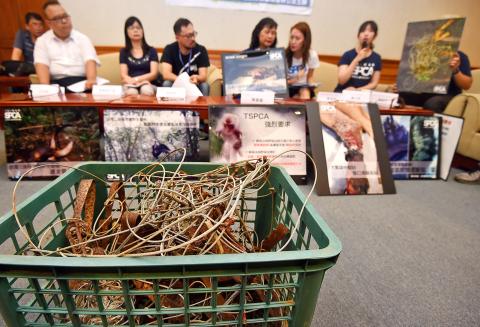An animal advocacy group yesterday called for a ban on steel snares, which they said hurt stray dogs, while an expert said that a ban could result in farmers using more inhumane alternatives such as poison.
Taiwan Society for the Prevention of Cruelty to Animals executive director Connie Chiang (姜怡如) said the group has found that monkeys and stray dogs were caught in steel snares, resulting in broken limbs or starvation.
Chiang cited a report by the Yilan County Animal and Plant Disease Control Center for the society’s findings.

Photo: Chien Jung-fong, Taipei Times
Control center section chief Liu Pi-yang (劉必揚) said an inspection in 2015 found about 80 steel snares in the Paolun community (匏崙) in Jiaoxi Township (礁溪), adding that five stray dogs have been injured by snares since then.
“It is difficult to identify who is setting up the snares,” he said.
The society’s legal specialist, Chou Jing-fan (周敬凡), called for an official ban on the steel snares.
Article 19 of the Wildlife Conservation Act (野生動物保育法) prohibits “the use of traps, snares or other hunting equipment” to capture animals, Chou said, adding that the act should be amended to explicitly ban steel snares.
“Any cruel device [for capturing animals] should be banned,” he added.
Protecting animals is everyone’s obligation, Democratic Progressive Party Legislator Chen Man-li (陳曼麗) said, adding that she supports the proposed ban.
“This has nothing to do with the conflict between Aborigines and Han people,” she added.
However, Savungaz Valincinan, a member of the Indigenous Youth Front, said advocates of the ban were criminalizing Aborigines.
She said that animal rights advocates should not frame the issue around “prohibition” and Aborigines’ accountability.
Many farmers, not only Aborigines, use snares to capture intruding animals, said Kurtis Jai-Chyi Pei (裴家騏), professor at National Dong Hwa University’s College of Environmental Studies.
Banning steel snares might be counterproductive because farmers would find alternatives like using poisons, he said, adding that stray animals and leopard cats are often injured by such methods.
People who want to capture animals should use more humanitarian means that are precise and cause no suffering to animals, he said.
“Traps are already banned, but many people are still using them,” he said. “The key lies with improving enforcement.”

Alain Robert, known as the "French Spider-Man," praised Alex Honnold as exceptionally well-prepared after the US climber completed a free solo ascent of Taipei 101 yesterday. Robert said Honnold's ascent of the 508m-tall skyscraper in just more than one-and-a-half hours without using safety ropes or equipment was a remarkable achievement. "This is my life," he said in an interview conducted in French, adding that he liked the feeling of being "on the edge of danger." The 63-year-old Frenchman climbed Taipei 101 using ropes in December 2004, taking about four hours to reach the top. On a one-to-10 scale of difficulty, Robert said Taipei 101

Nipah virus infection is to be officially listed as a category 5 notifiable infectious disease in Taiwan in March, while clinical treatment guidelines are being formulated, the Centers for Disease Control (CDC) said yesterday. With Nipah infections being reported in other countries and considering its relatively high fatality rate, the centers on Jan. 16 announced that it would be listed as a notifiable infectious disease to bolster the nation’s systematic early warning system and increase public awareness, the CDC said. Bangladesh reported four fatal cases last year in separate districts, with three linked to raw date palm sap consumption, CDC Epidemic Intelligence

Taiwanese and US defense groups are collaborating to introduce deployable, semi-autonomous manufacturing systems for drones and components in a boost to the nation’s supply chain resilience. Taiwan’s G-Tech Optroelectronics Corp subsidiary GTOC and the US’ Aerkomm Inc on Friday announced an agreement with fellow US-based Firestorm Lab to adopt the latter’s xCell, a technology featuring 3D printers fitted in 6.1m container units. The systems enable aerial platforms and parts to be produced in high volumes from dispersed nodes capable of rapid redeployment, to minimize the risk of enemy strikes and to meet field requirements, they said. Firestorm chief technology officer Ian Muceus said

MORE FALL: An investigation into one of Xi’s key cronies, part of a broader ‘anti-corruption’ drive, indicates that he might have a deep distrust in the military, an expert said China’s latest military purge underscores systemic risks in its shift from collective leadership to sole rule under Chinese President Xi Jinping (習近平), and could disrupt its chain of command and military capabilities, a national security official said yesterday. If decisionmaking within the Chinese Communist Party has become “irrational” under one-man rule, the Taiwan Strait and the regional situation must be approached with extreme caution, given unforeseen risks, they added. The anonymous official made the remarks as China’s Central Military Commission Vice Chairman Zhang Youxia (張又俠) and Joint Staff Department Chief of Staff Liu Zhenli (劉振立) were reportedly being investigated for suspected “serious